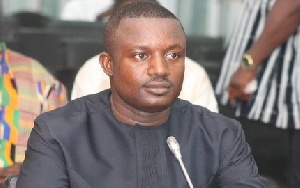Mr John Abdulai Jinapor, Deputy Minister-designate for the Ministry of Energy and Petroleum on Monday branded the ongoing national gas project as the panacea to the country’s economic success.
He said with the rising cost of crude oil, and the country’s thermal installations requirement to generate power, significant gas resource would reduce the cost of producing electricity considerably and would thus place the country in a stead to maximize the gains of the resource to further its development imperatives.
“Gas for me is what will turn this economy around… The gas project is so essential that we just can’t take our eye off the project, he said when he appeared before Parliament’s Appointment Committee to be vetted.
He is among 35 deputy ministers nominated by President John Dramani Mahama.
To buttress his point, Mr Jinapor explained that 7,000 cubic feet of gas cost between 28 to 30 dollars compared to a barrel of oil that cost almost 110 dollars in terms of firing a thermal plant.
“So, when you use gas, you are using a maximum amount of about 40 per cent of what you would have used crude for and so we need gas like yesterday because that will reduce the cost of producing electricity. It also enhances the efficiency of machines to prolong their lifespan,” he said.
Presently, about 45 kilometers of the gas pipeline for the Atuabo Ghana Gas Company project has been completed. Seventy per cent of the onshore project has also been concluded.
He said the current challenge that Ghana faces in the energy sector is as a result of shortage of generation capacity and government is diligently working to solve the problem in the short and long term.
Ghana currently has a generating capacity of 2,255 Megawatt and peak demand is around 1,750 Megawatt.
Mr Jinapor said Ghana had a major problem with the West African Gas Pipeline that mired the production of some 200 megawatt of electricity from the Sunong Asogli Thermal Plant, creating an energy deficit.
This led to the current load management exercise by the Electricity Company.
He said government is assiduously engaging stakeholders to guarantee the flow of gas through the pipeline and that this, with other interventions aimed at adding about 264 megawatt at Takoradi T3 thermal plant and the Bui hydro project.
This, he said would soon negate the load shedding crisis.
“We are not resting because the President has indicated that by 2016, we should be able to wrap up our generating capacity to 5,000 Megawatt. This is an ambitious policy but we believe that it is possible.”
To this end, government intends to carry out a number of projects like the construction of a thermal plant and small hydro dams, as well as diversifying the energy mix to encompass renewable energy sources to meet the 5,000 megawatt ambition to sustain industrial growth and development.
Mr Jinapor said despite the energy challenge, Ghana is doing very well compared to countries in the sub-region with its electricity generation capacity of 72 per cent compared to Nigeria’s 50 per cent, Kenya’s 30 per cent and Cote d’Ivoire’s 45 per cent generation rate.
“And so, not as if we haven’t done something. We are doing a lot. I am confident that we will deal with the short term problems, we will deal with the medium term problems and deal with the long term problems,” he said.
On the Issue of the Tema Oil Refinery (TOR), the deputy minister designate said that national asset’s challenges could be overcome.
He said one main concern was the technical ineptitude of TOR that had limited its operational efficiency, reducing the production rate of the Crude Distillation Unit of the refinery to 45,000 barrels a day instead of the maximum capacity of 60,000 barrels per day.
Government, he said had sought to make that entity viable and profitable and had already released 30 million dollars to TOR in furtherance of the objective, with an additional 37 million dollars expected to be provided to enable the stabilisation of the plant to enhance its profitability.
He said these interventions and other measures to prevent revenue leakages would be put in place to enable the refinery save more than a 100 million dollars annually.
Mr Jinapor suggested the giving of shares to employees of TOR as is done in businesses across the world to engender belonging among the workers.
Other nominees vetted included Mr Sampson Ahi, Member of Parliament for Bodi for Water Resources, Works and Housing, Mr Joseph Yammin, Youth and Sports, Mr Benjamin Dagadu, Energy and Petroleum and Dr Musheibu Mohammed-Alfa, Environment, Science, Technology and Innovation.
Business News of Tuesday, 16 April 2013
Source: GNA

















